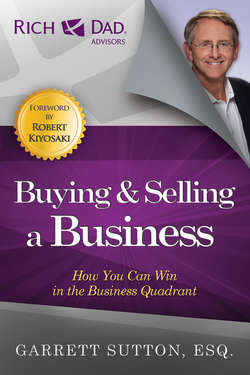Читать книгу Buying and Selling a Business - Garrett Sutton - Страница 32
На сайте Литреса книга снята с продажи.
Business Broker
ОглавлениеBusiness brokers (also referred to as business intermediaries, or mergers and acquisitions specialists) act in the same way that real estate brokers do – as intermediaries between buyers and sellers. They have listings from numerous sellers and can search out the right business for a buyer, often working with other brokers and going through their listings as well. They may be retained by either buyer or seller (though it is usually by the seller) and are particularly useful for buyers looking for a business outside the industry with which they are familiar. Keep in mind that there are few or no requirements for business brokers. In many states anyone can become one with no experience or education. For this reason, it is very important for the buyer or seller to do some research. Referrals from lawyers, accountants or bankers are a good place to start when searching for a good business broker.
For a seller, the primary benefit of using a broker is confidentiality. The broker can field calls and deal with prospective buyers for you, thus keeping your plans for a sale away from customers, suppliers and employees. He or she can prescreen potential buyers to be sure of their level of interest as well as their ability to pay, thus saving you the hassle of dealing with looky-loos and possibly even competitors. An experienced broker can advise you how much you might be able to receive for your company and can help structure the deal in a way that minimizes your risk should the deal fall through.
A business broker charges anywhere from 5 percent to 15 percent of the selling price, payable once the deal is done. For this reason, beware of a broker who is pushing for a close before both sides are comfortable doing so. It is not unheard of for an unscrupulous broker to push individuals to buy a business, any business, just so he or she can get the commission. It is also not unheard of for a broker to aid the seller in pumping up the sale price in order to pump up his or her own commission. So be keenly aware of what it is that gives the broker an incentive, and then stick to a strategy that is best for you.
The commission is usually paid by the seller. Sellers should try to structure the agreement so that they pay a portion at the close and the rest as the balance is paid. The seller should want the broker to take a risk on non-payment by the buyer as well.
Some things to consider when looking for a broker are:
• how long he or she has been in business
• what, if any, continuing education courses the broker has passed
• whether or not he or she has ever owned a business
• how many deals similar to yours he or she has brokered
• whether or not he or she (or the firm) belongs to a national broker organization (such as the International Business Brokers Association or the Institute of Certified Business Counselors)
Be sure to get references and follow through by calling them. It’s also a good idea to ask each reference if they know others who have worked with the broker. Don’t leave without fully understanding what the broker will do for you and then get it in writing.
Good brokers will not only ask how much a buyer has to spend, but also about professional and personal interests, as well as family and work obligations. This helps them determine what kind of business might work best for the buyer. If they show no interest in your personal life and other outside influences, consider finding a more thorough broker.
Some brokers want to do your negotiating, some don’t. Regardless of what the broker wants, it is your decision on how to handle the transaction. You need to communicate your wishes clearly.
Nevertheless, buyers should consider accepting any help a broker can provide. A good one can give you information on the company’s industry, market, management and customers. There is no guarantee as to the accuracy of this information, but it will be a good starting point for your own investigation. Have the broker cite his or her sources so you can go back and check the information. This will be much quicker than initially researching it yourself.
If you are a real hands-on type of person, a broker may not be for you. Brokers tend to worry about being cut out of the deal and left without a commission. Many are reluctant, at best (unwilling, at worst), to let buyers meet directly with the owner of the business, especially in the early stages of the deal. Most brokers will require sellers to sign an exclusivity agreement that says no one else has the right to sell the business during the time period spelled out in the agreement (usually at least three months). If the buyer or seller violates the agreement and/or decides not to complete the transaction, they will still have to pay that broker a commission. However, sellers can and should consider structuring the agreement so that they don’t pay a commission should they sell a business to someone they find on their own.
